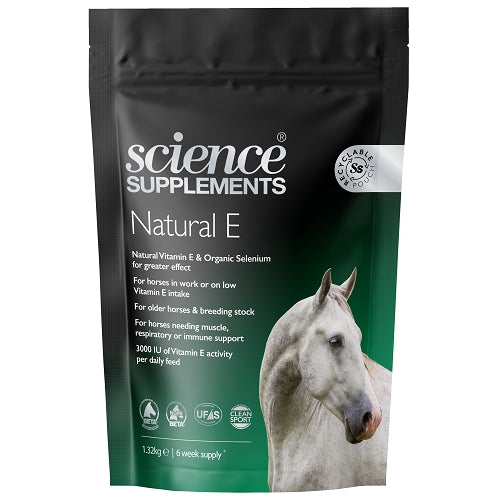You have no items in your shopping cart.

| ID: | 7294892703815 |
| Category: | Science Supplements - Supplements |
What is Vitamin E?
Vitamin E is a powerful antioxidant vitamin that cannot be made by the horse and must be obtained from the diet. Vitamin E is essential for healthy functioning of muscles, the immune system, reproductive function and the nervous system. Many horses may have an increased need for Vitamin E, including those on low Vitamin E intake due to low quality forage, those on diets with added oil, those in work, 'older' animals and those used for breeding. Many Vitamin E supplements use the much cheaper synthetic forms of Vitamin E. Natural E, as the name suggests provides a natural source of Vitamin E which has up to double the biological activity than synthetic forms of Vitamin E. Natural E also contains organic selenium which is essential for the optimal activity of Vitamin E. Natural E deliver 3000IU of Vitamin E activity and 1mg of selenium per daily horse feeding rate.
What does Vitamin E do?
Vitamin E is central to muscle and nerve function, heart health, immune function, lung health and skin health.
Where do horses get Vitamin E from?
Horses cannot make Vitamin E and must get it from their diet. It is therefore essential that sufficient Vitamin E is fed or supplemented.
What form of Vitamin E is best - Natural or Synthetic?
Many Vitamin E supplements use the much cheaper synthetic forms of Vitamin E. Natural E, as the name suggests provides a natural source of Vitamin E which has up to double the biological activity than synthetic forms of Vitamin E. Natural E also contains organic selenium which is essential for the optimal activity of Vitamin E.
Vitamin E in different horse feed materials
Vitamin E is higher in fresh forage than in preserved forages. Vitamin E levels in commercial dry horse feeds are naturally very low due to processing and so Vitamin E must be supplemented. As Vitamin E is a relatively expensive feed ingredient the levels added may be on the low side.
What is the difference between mg and IU?
Sometimes Vitamin E is expressed as the weight in mg or as IU, which stands for International Units. The two are related but slightly different. The weight is the same for different forms of Vitamin E but the IU is how it works in the body or the activity. So for example, for 1 mg of synthetic Vitamin E the biological activity in the body would be equivalent to around 1.5 IU. Feeding 100mg of Vitamin E would therefore give you 150 IU of Vitamin E activity.
How much Vitamin E do horses need?
Amount per day of Vitamin E for a 500kg horse
| Minimum | Recommended | |
| Mature horse (Maintenance) | 500IU per day | 1000IU per day |
| Growing horses | 800IU per day | 1600IU per day |
| Broodmares & Stallions (non-breeding) | 1000IU per day | 2000IU per day |
| Broodmares & Stallions (breeding) | 1400IU per day | 3000IU per day |
| Mature horse Hard Work | 1000IU per day | 2000-4000IU per day |
| Racehorse (2yo) Moderate to Heavy exercise | 1500IU per day | 3000IU per day |
| Horses needing muscle support | 500IU per day | 2000-3000IU per day |
| Mares in foal (Last 3 months) | 1500IU per day | 4000IU per day |
| Lactating mares | 800IU per day | 2000IU per day |
| Recovering horses | 500IU per day | 3000IU per day |
| Horse receiving oil in the diet | 1IU/ml of oil | 1IU/ml of oil |
| Horses needing immune support | 500IU per day | 3000IU per day |
| Horses needing respiratory support | 500IU per day | 2000-3000IU per day |
| Older horses (>15 years of age) | 600IU per day | 3000IU per day |
How much Natural E do I feed?
1 level 25ml scoop (16.8g) provides 1500IU of Natural Vitamin E and 0.5mg of Organic Selenium. The daily amount should ideally be split between at least two feeds.
| 25ml scoops | Vitamin E |
| 1/4 scoop | 375 IU |
| 1/2; scoop | 750 IU |
| 3/4 scoop | 1125 IU |
| 1 scoop | 1500 IU |
| 1 1/4 scoops | 1875 IU |
| 1 1/2 scoops | 2250 IU |
| 1 3/4 scoops | 2625 IU |
| 2 scoops | 3000 IU |
| 2 1/4 scoops | 3375 IU |
| 2 1/2 scoops | 3750 IU |
| 2 3/4 scoops | 4000 IU |
| 3 scoops | 4500 IU |
| 3 1/2 scoops | 5000 IU |
| 4 scoops | 6000 IU |
Instructions for use and feeding guide
Level 25ml (16.8g) scoops per day
For horses on low forage intake, breeding stock, or horses on high oil intake:
Pony (approximately 250kg) 1 x 25ml scoops per day
Horse (approximately 450-550kg) 2 x 25ml scoops per day
Large Horse (approximately 750kg) 3 x 25ml scoops per day
For older horses, those in hard work and those needing immune or muscle support:
Pony (approximately 250kg) 1-2 x 25ml scoops per day
Horse (approximately 450-550kg 3-4 x 25ml scoops per day
Large Horse (approximately 750kg) 4 x 25ml scoops per day
Do not exceed the recommended intake. The Vitamin E and Selenium intake from other dietary components should be considered. If in doubt, please contact our nutritional helpline for detailed advice.
Active Ingredients: Per daily dose (2 x 25ml) 33.6g provides: Vitamin E 3000IU; 1mg Selenium; 5g L-Lysine; 2g DL-Methionine.
Additives (per kg): Vitamin E (Natural) RRR alpha-tocopherol (3a700) 95.2 KIU/kg.
Level 25ml (16.8g) scoops per day divided between either 1 or 2 feeds
| Pony Approximately 250kg | Horse Approximately 450-550kg | Large Horse Over 650kg | |
|---|---|---|---|
| For horses on low forage intake, for breeding stock or for horses on increased oil intake | 1 | 2 | 3 |
| For older horses, For horses in hard work, for horses with muscle problems, poor immune function, etc | 1.5 | 3-4 | 4 |
Do not exceed the recommended intake. The Vitamin E and Selenium intake from other dietary components should be considered. If in doubt please contact our nutritional helpline for detailed advice.
Per daily dose (2 x 25ml) 33.6g provides: Vitamin E 3000IU; 1mg Selenium; 5g L-Lysine; 2g DL-Methionine.
CompositionNatural Vitamin E, DL-methionine, lysine hydrochloride, organic selenium from yeast, rice flour.
AnalysisProtein 23.0%; Fibre 2.0%; Oils & Fats 7.0%; Ash 17.0%; Moisture <4%.
Please note that we cannot send supplements to Australia without a valid BICON permit.
Australian citizens will need to obtain a BICON permit prior to purchase & send us the documentation prior to export.











